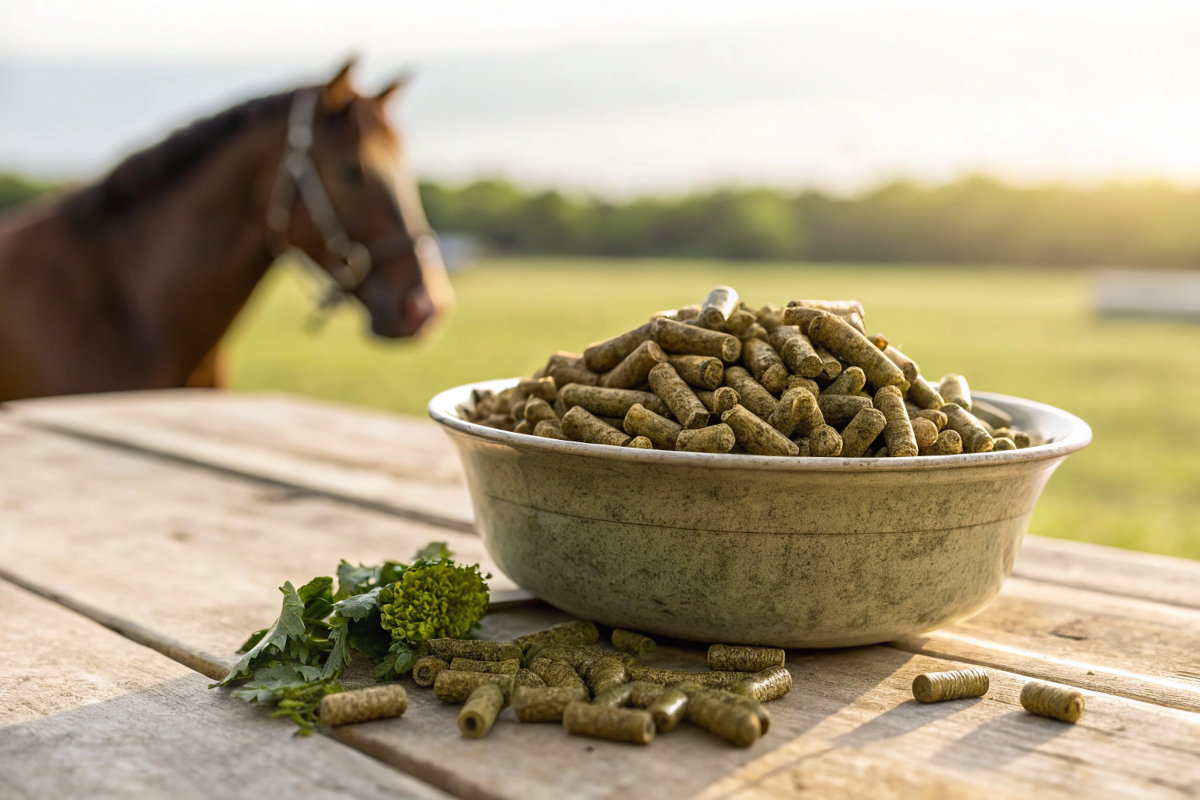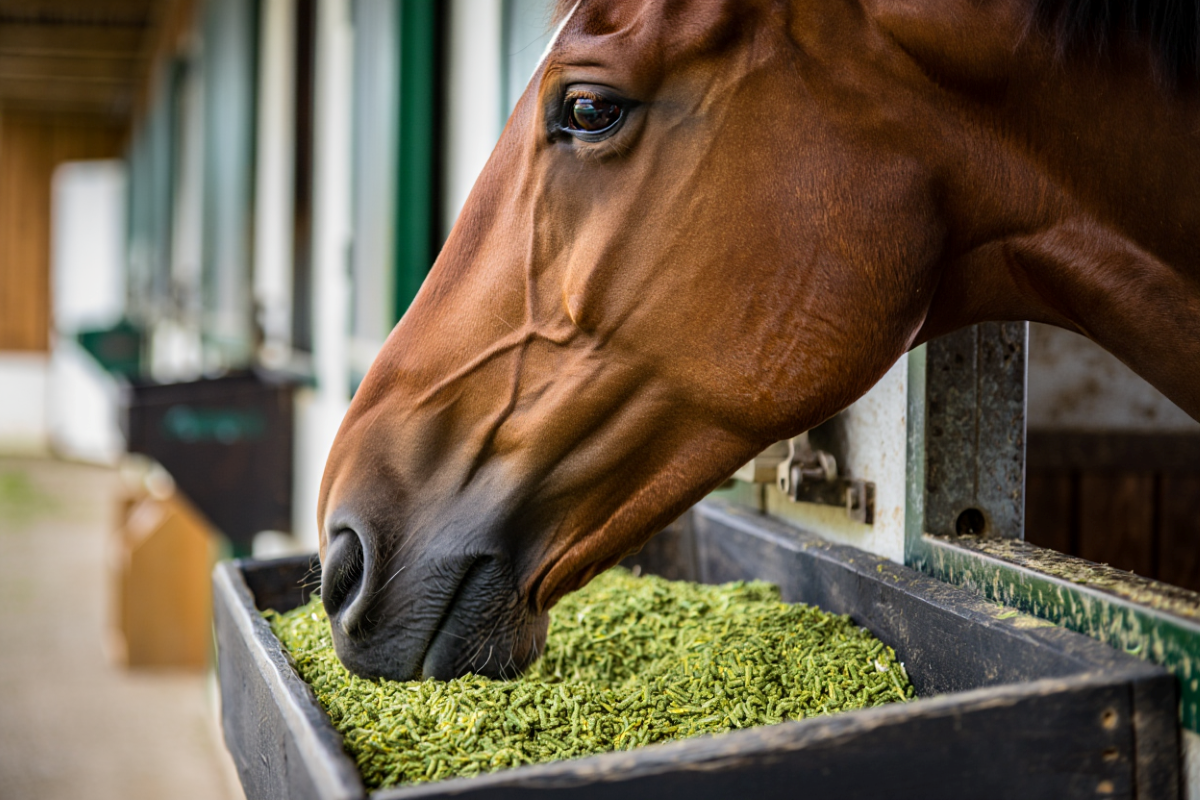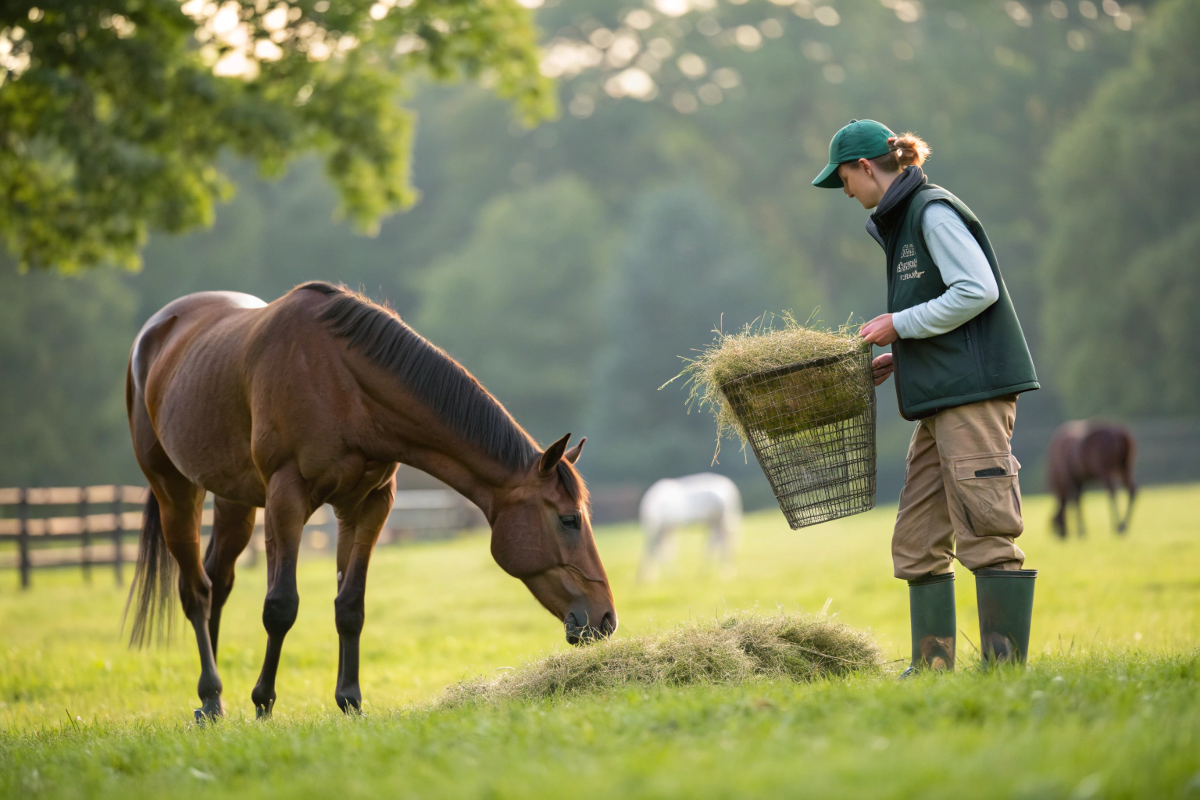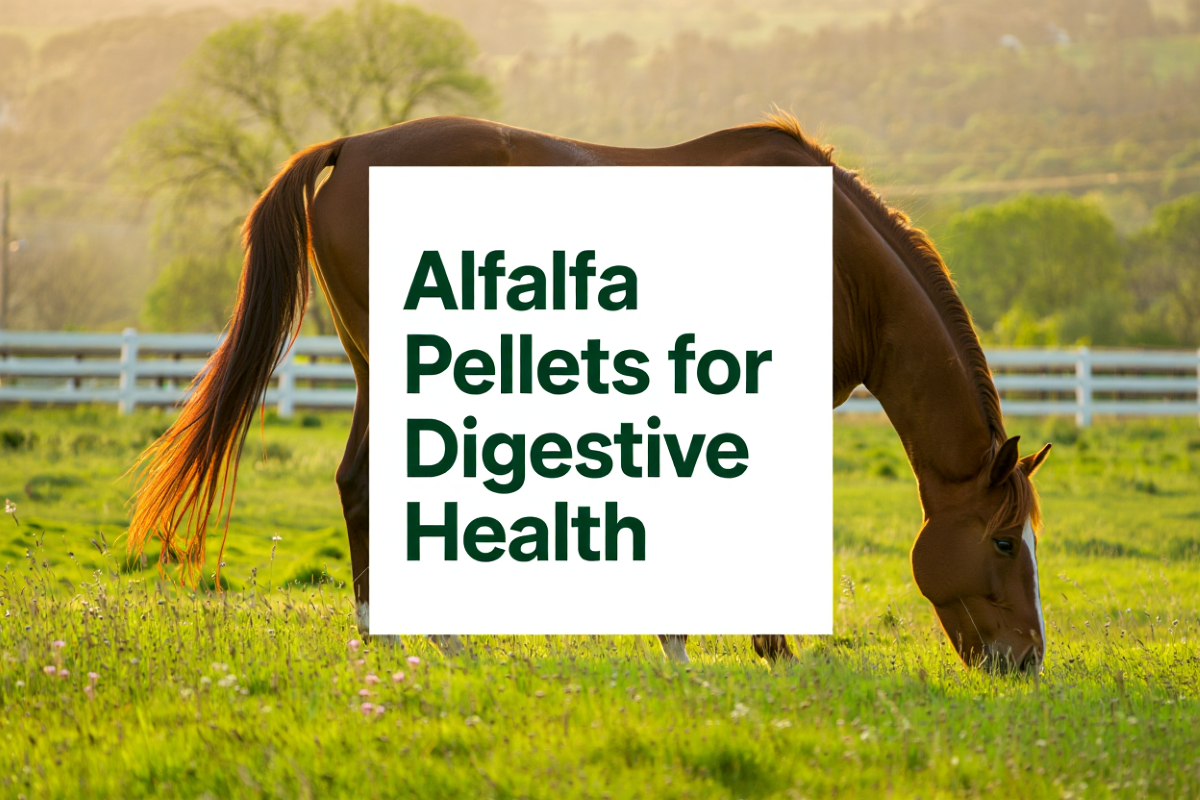Managing Ulcers in Horses with Alfalfa Pellets: Myth or Fact?

Horse owners and equine professionals have long sought effective strategies for managing gastric ulcers, a prevalent condition in modern equine care. Among the many suggestions circulating in the community, one frequent topic of conversation is the use of alfalfa pellets for managing horse ulcers. But is this approach truly based on science, or simply a myth?
Do Alfalfa Pellets help Ulcers in Horses?
We’ll explore the science, benefits, and best practices for managing horse ulcers with alfalfa pellets, clarify common misconceptions, and help you decide if incorporating alfalfa pellets or cubes into your horse’s forage routine is the right choice. As you’ll learn, when used correctly, high-quality forage—particularly alfalfa—can play a valuable role in ulcer prevention and recovery.
Understanding Equine Gastric Ulcers
Gastric ulcers are widespread in horses, affecting up to 90% of performance horses and a significant percentage of leisure and breeding horses. Ulcers occur when the protective lining of the horse’s stomach becomes damaged by excessive gastric acid.
The modern horse’s lifestyle—frequent transport, training, competition, irregular feeding schedules, and high-grain diets—has made ulcers an all-too-common problem. Signs can include poor appetite, weight loss, girthiness, behavioral changes, poor performance, and even colic.
Preventing ulcers begins with understanding the horse’s natural digestive system. Horses are grazing animals designed to consume small amounts of forage throughout the day. When their natural grazing behavior is disrupted or replaced by calorie-dense feeds, stomach acid has the chance to accumulate and cause damage. This is where forage like alfalfa pellets and cubes come into play.

Alfalfa: The Forage with Benefits
Alfalfa is a legume forage that differs significantly from typical grass hays. It’s higher in calcium, protein, and digestible energy. When it comes to managing ulcers, the key feature is calcium, a natural buffer against gastric acid.
Here’s why alfalfa forage can be beneficial:
- Calcium & Magnesium Content: Alfalfa contains naturally high levels of calcium and magnesium. These minerals help buffer stomach acid, reducing the risk of mucosal damage.
- Chew Time: The fibrous nature of alfalfa cubes and pellets encourages chewing, which stimulates saliva production. Saliva is alkaline and helps neutralize stomach acid.
- Slow Digestibility: Forage like alfalfa cubes is digested more slowly than concentrates, leading to prolonged satiety and more consistent acid production.
Several veterinary studies have demonstrated that horses fed alfalfa forage showed fewer signs of gastric ulceration, particularly when combined with consistent feeding schedules and reduced grain intake.
Pellets vs. Cubes: What’s the Difference?
When it comes to alfalfa products, you’ll find both alfalfa pellets and alfalfa cubes. While both are derived from the same high-quality forage, they serve different purposes in the horse’s diet and ulcer management strategy.
Alfalfa Pellets
- Smaller Size: Ground and compressed into pellet form, making them easy to mix with other supplements.
- Supplemental Use: Best used as a supplement, not a full forage replacement.
- Convenient: Ideal for adding to meals or encouraging picky eaters.
- Feeding Tip: Soaking for 30 minutes or until softened is recommended, especially for older horses or those with dental issues, but not mandatory.
Alfalfa Cubes
- Larger and More Fibrous: Cubes provide longer chew time, mimicking natural grazing more effectively.
- Forage Foundation: Excellent for high-performance horses who need top-tier forage.
- Feeding Tip: Soaking is strongly advised if your horse eats quickly or has trouble chewing, but it’s not required in every case.
Ultimately, cubes serve as a more comprehensive forage option, while pellets are a fantastic supplement to reinforce buffering effects and increase nutrient density.

Why Bales of Hay Aren’t in the Equation
While traditional baled hay still plays a role in many feeding programs, it’s not the focus of this article or of high-precision ulcer management strategies. When dealing with ulcers, bagged alfalfa cubes and pellets provide a cleaner, more consistent, and nutritionally predictable option.
Cubes and pellets ensure standardized nutrient levels, which are essential for performance horses and those recovering from ulcers. This precision feeding approach avoids variability in baled forage, making it easier to manage your horse’s condition effectively.
Feeding Myths Busted: The Alfalfa Controversy
Despite its many benefits, alfalfa has garnered some controversy in the equine world. Let’s clarify a few myths:
Myth #1: Alfalfa Causes Kidney Damage
This myth stems from the high protein and calcium content in alfalfa. However, healthy horses have no trouble metabolizing the nutrients in alfalfa. There’s no scientific evidence linking alfalfa forage to kidney issues in horses with normal renal function.
Myth #2: Alfalfa is Too “Rich” for Most Horses
Alfalfa is nutrient-dense, which makes it highly efficient, but this doesn’t mean it’s inappropriate. Horses in moderate to high workloads, breeding mares, and growing foals often require higher protein levels and digestible energy. The key is balance: alfalfa should be fed in amounts that support your horse’s activity level.
Myth #3: Pellets Replace Forage
While alfalfa pellets are a powerful supplement, they do not replace long-stemmed forage. Horses need chew time and gut motility stimulation from roughage. Forage cubes can be fed as true replacements.
Performance Horses and Premium Forage
High-performance horses—whether in racing, dressage, show jumping, or endurance—have unique nutritional demands. Due to stress, intense training, and travel, these horses are often more susceptible to ulcers.
For this population, alfalfa cubes of excellent quality are especially valuable. They provide long-lasting energy, maintain muscle mass, and support gut health. Feeding cubes twice a day, along with free-choice grass forage and top-dressed alfalfa pellets, can help:
- Prevent ulcer flare-ups
- Support recovery from existing gastric issues
- Maintain optimal condition during heavy workloads
Premium forage cubes offer consistent quality and digestibility. They’re particularly useful when pastures are unavailable or seasonal forage is limited.
The Importance of Feeding Strategy
While alfalfa pellets and cubes are beneficial, the feeding strategy plays a critical role in managing ulcers.
Key Guidelines:
- Consistency is Key: Feed regularly to keep stomach acid production steady.
- Pre-ride Forage: Give a handful of alfalfa pellets or cubes 30 minutes before riding to coat the stomach.
- Minimize Grain Feeds: High-grain diets can increase acid production; forage should be the primary calorie source.
- Monitor Body Condition: Adjust feed volume based on weight, condition, and work level.
- Hydration Support: Soaking forage products increases moisture intake and reduces choke risk, especially in dry climates.
Bedding Considerations: Loose vs. Pelleted Straw
While our focus is on managing ulcers with alfalfa forage, it’s worth noting that bedding can indirectly affect your horse’s digestive health. Horses on stall rest or under stress may chew on their bedding, especially when hungry or bored.
Using bagged straw bedding, either loose or pelleted, can be a safer option than other materials. Pelleted straw bedding is dust-free, absorbent, and discourages consumption. For sensitive horses, it’s a healthier stall choice.

How Greenway Animal Nutrition Supports Horse Health
At Greenway Animal Nutrition, we recognize that high-quality feed is essential for maintaining healthy, well-nourished horses. That’s why we offer premium forage products, including alfalfa pellets and cubes, tailored to meet the needs of horse owners, breeders, and trainers.
Whether you’re caring for a high-performance athlete, a trusted riding partner, or a herd on your farm, our carefully selected forage pellets and cubes deliver the consistency, digestibility, and buffering capacity you need for effective ulcer management and overall wellness.
Our forage products are:
- Sourced from trusted growers with strict quality control
- Bagged for hygiene and convenience
- Designed to support gastric and overall digestive health
- Backed by a team committed to the well-being of your animals
Fact or Myth?
So, is managing horse ulcers with alfalfa pellets a myth or a fact?
It’s a fact—with conditions. When used thoughtfully, alfalfa pellets and cubes can be a powerful addition to your ulcer management strategy. They’re not a cure-all, but as part of a well-rounded nutritional program, they offer clear benefits.
From buffering stomach acid to supporting energy needs in high-performance horses, alfalfa forage—especially when offered in premium, bagged pellet and cube form—deserves a place in your feeding regimen.
![]()
Take the Next Step with Greenway Animal Nutrition
Ready to elevate your horse’s health with premium forage solutions?
At Greenway Animal Nutrition, we believe in giving back to the animal community through quality, care, and service. Our team is here to help you choose the right forage options for your horses, whether you’re battling ulcers or simply striving for optimal health.
Explore our range of alfalfa pellets and cubes today. Have questions? Reach out and speak with one of our equine nutrition specialists—we’re here to support you.